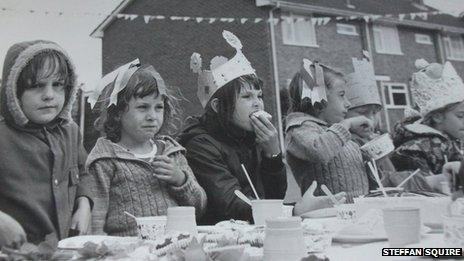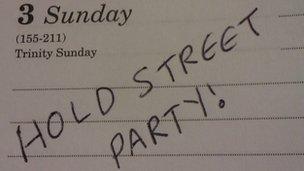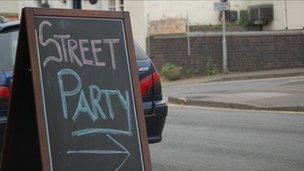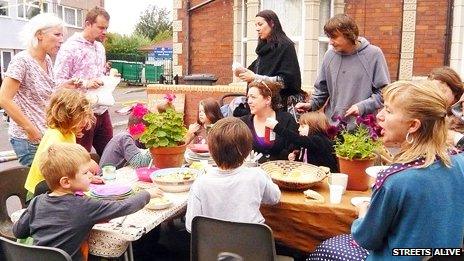Diamond Jubilee: Five street party essentials
- Published

Street parties have long been a favourite way of celebrating major events
The Diamond Jubilee will see a host of public events to mark the 60th year of the Queen's reign.
Many people are expected to get involved by holding street parties in cities, towns and villages across the UK.
But how do you organise a successful street party and make sure you stay on speaking terms with your neighbours?
According to Steffan Squire, who organised a royal wedding street party in Hampshire, giving yourself enough time is crucial to having a successful party.
She said it takes at about two months to organise a street party - meaning now is the time to get busy if your street party is going to be organised in time for the main Jubilee celebrations.
<link> <caption>Streets Alive</caption> <url href="http://www.streetparty.org.uk/" platform="highweb"/> </link> , a not-for-profit group which promotes community spirit, also recommends getting started well in advance.
So with a crack team of willing helpers signed up, here are the five essentials for a stress-free street party:
1. DATE

What is the best date for a street party?
The major celebrations will take place on an extended bank holiday weekend on 2, 3, 4 and 5 June.
But when should you hold your own get-together?
<link> <caption>The Big Jubilee Lunch</caption> <url href="http://www.thebiglunch.com/" platform="highweb"/> </link> will take place nationwide on 3 June.
It is part of the main programme of events so might be the best date to hold a street party.
The event, launched by The Eden Project in 2009, aims to improve society by helping people to meet their neighbours and feel part of a wider community.
'Rich heritage'
The organisers are hoping millions of people will take part this year and are working with partners including the Scout Association, Rotary International in Great Britain and Ireland, Neighbourhood Watch, the National Federation of Women's Institutes, Age UK and Age Cymru, to encourage people to hold their own event.
It is the same day as the Thames Diamond Jubilee pageant so if it does rain neighbours can always gather in the nearest lounge to watch the events from a dry point.
Tim Smit, chief executive of the Eden Project, said: "Britain has a rich heritage of organising street parties for royal celebrations.
"We're honoured to be part of the Queen's Diamond Jubilee weekend, and we're sure millions of people will break bread together on 3 June, making this the biggest Big Lunch yet."
Streets Alive director Chris Gittins said Sunday was a good choice for a street party because those employed in the retail sector often work on Saturdays.
He said: "Sunday or Monday are the best choices because people work or do things like go shopping on Saturdays."
2. BUNTING

Bunting is a traditional feature of a street party
Carol Mowl organises bunting <link> <caption>workshops</caption> <url href="http://www.beetlefelt.co.uk/workshop_fest_bunting.html" platform="highweb"/> </link> for children and adults in Chorlton, Manchester.
She said bunting was easy to make and could be a great project for neighbours to work together on.
"It's easy and fun and everyone can do it," she said.
"You can recycle bits of old fabric, paper and rubbish if you want it to be green.
"You don't need to be able to sew, just cut and glue shapes on to string. You can decorate them with paint or use felt pens.
"They don't even need to be triangles, they can be any shape you like."
She added a diamond shape folded in half made strong bunting which was also a nice way to acknowledge the Diamond Jubilee.
3. FOOD
It might be tempting to go down the traditional route when organising what many will view as a quintessentially British event.
But that is not necessarily the best option according to Peter Lien, cookery school manager for the Women's Institute.
He said: "The thing with street party food is you want to get as many people involved as possible.
"The food should reflect the people in the street so you don't have to stick to traditional old stuff - you could have Indian, English and Polish food, people can contribute their own thing.
"The point is it's a great way for people who don't normally speak to each other to get to know each other a bit better."
He said it was possible to have a nod to the classics such as coronation chicken and Victoria sponge but any cake or biscuit could be decorated with a royal theme.
"It's a great way of getting children involved in baking cakes and biscuits," he said.
He added cold finger food was the best option for a street party because it was safer than serving hot food and could be left out longer for people to enjoy throughout the day.
He said: "A barbecue is a riskier proposition if you're catering for a lot of people and hot buffet food has to be kept at 63C, you need the right equipment to do that.
"The other good thing about cold food is there's less clearing up."
4. LOGISTICS

How do you avoid getting tangled in red tape?
Last year the media reported on "petty bureaucracy" from some councils when residents attempted to organise street parties to celebrate the royal wedding.
The stories even prompted Prime Minister David Cameron to warn local authorities against interfering in party plans.
This year the Local Government Association (LGA) has announced that councils will try to make organising a street party as stress-free as possible.
In March the LGA said about 3,500 road closure applications for street parties had been received by councils so far.
'Common sense'
A spokesman said many authorities were waiving road closures fees, offering cash grants and giving out party packs.
Councillor Flick Rea, chair of the LGA's culture, tourism and sport board, said: "Bringing communities together is something councils see as one of their key roles so it's fantastic that Diamond Jubilee weekend looks set to see people everywhere coming together to enjoy a good old knees-up.
"As they did for the royal wedding, councils are trying to make organising street parties as easy as possible.
"There will of course be cases where a genuine concern means a proposed celebration may not be able to go ahead, but through common sense and talking to each other councils and residents should be able to find amicable solutions to make a street party happen."
According to Streets Alive the council only needs to be informed if neighbours want to close their street.
Mr Gittins said sharing the organisation was the most important element.
He said: "The essential thing is sharing out responsibility.
"Anyone can write a list of tips and they do help but the key is motivation to actually turn a vague idea into something which actually happens.
"The main thing is to work with neighbours to solve problems that come up. Don't call yourself 'the organiser' - it has to be shared."
He said insurance was not mandatory but if residents want to have it they could ask everyone to make a small donation or hold a raffle to raise the fee, which is generally around £50.
5. NEIGHBOURS

Street parties can be a great chance to get to know people who live on your road
Ms Squire, who organised a royal wedding street party in Andover, said it was important to gauge interest in holding a street party in advance.
"In the beginning I went round all my neighbours a couple of months before and put notes through their doors to say I was thinking about organising a street party and there would be a meeting at my house," she said.
About seven people turned up to the first meeting with weekly get-togethers held after that.
"We divided up into groups and went round to each house to see if people wanted to take part," she said.
"Some people said they were really not interested or they were going to be away but in the end 250 people took part and it was really successful."
Decorations were bought in advance, people brought their own food and drink and items like chairs and tables were borrowed.
Some food was donated by local supermarkets because the event was for charity - adults were charged £5 to attend, children were not charged, and once costs were covered the remainder was donated to a local children's hospice.
Ms Squire said street parties were an important tradition: "Community spirit has been lost but street parties give people the chance to get together with their neighbours, which is what it used to be like. People should still get to know their neighbours."
But some may not wish to take part if they are anti-monarchy, such as those who support the campaign group Republic.
The group wants a democratic alternative to the monarchy and last year held a peaceful "not the royal wedding" street party in Red Lion Square, Holborn to highlight their campaign.
Mr Gittins said you do not have to be a committed royalist to get involved in the Diamond Jubilee: "In any street in Britain you get people with different views about the Royals from patriotic flag-wavers to anti-royalists and those in the middle.
"But street parties are a great tradition which give people the chance to meet their neighbours and let kids play in the street for a change."
- Published8 March 2012
- Published13 June 2012